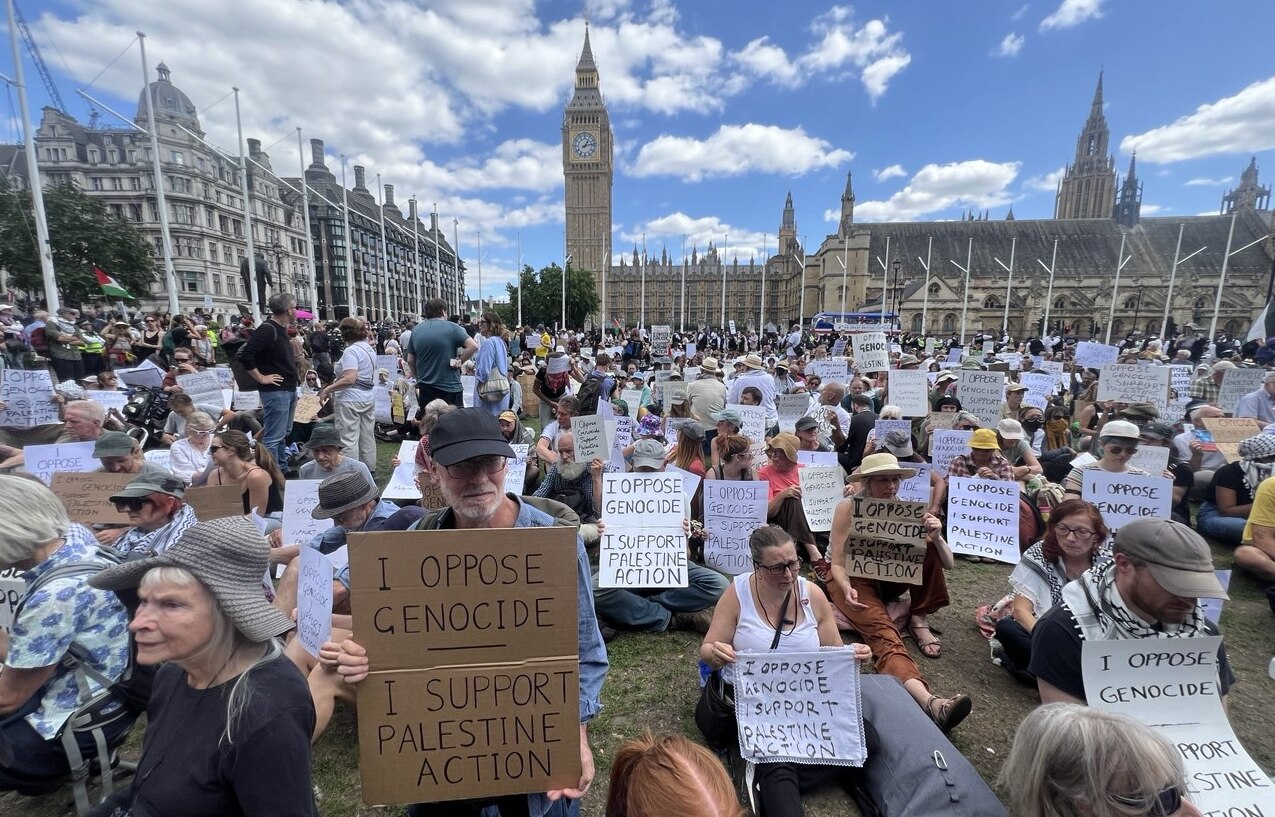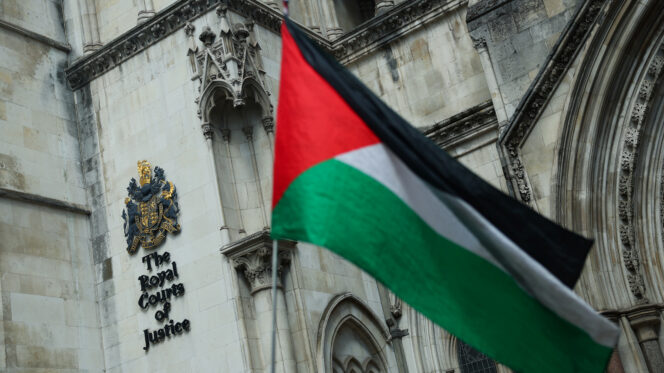Police Fail to Arrest Hundreds Who Defy Palestine Action Ban
It's unenforceable.
by Charlotte England
9 August 2025

More than 500 protesters gathered in Parliament Square today, turning their backs on Parliament because “Parliament turned against the people” and writing “I oppose genocide. I support Palestine Action” on cardboard placards as Big Ben struck 1pm.
By 2pm, when the organised action ended, the majority had not been arrested, suggesting the police – who faced protesters shouting “fascist scum” and “who do you protect?” – were not equipped to deal with the scale of the action, despite claiming last week that they would arrest everyone who took part and bussing in support from as far afield as Wales.
While van loads of protesters were taken away, others dropped their signs and left voluntarily, with cheers erupting from the crowd.
An 86 year-old, who left Parliament Square at 2.20pm unarrested, after holding an “I oppose genocide, I support Palestine Action’ sign for over an hour, said: “I have taken part in many political demonstrations over the last 70 years, but I cannot think of anything comparable to today, both in its social and political importance for Britain, or in terms of the human price being paid for government complicity in genocide.”
Although many walked away, hundreds chose to stay and be arrested, with police tightening the kettle and then gradually detaining protesters over the next six hours. In total, the Met police made 522 arrests for holding a sign in support of Palestine Action, the most at any single event since 1961.
The action was organised by Defend Our Juries, a protest group that has coordinated challenges to the ban almost every week since Palestine Action was proscribed on 5 July, but it far exceeded past actions in terms of scale.
In contrast to past weeks, hundreds of supporters turned out to confront police and Zionist counter-protests.
Massive Attack’s Robert Del Naja was among those in Parliament Square with Defend Our Juries. “UK civil liberties are trapped in a manufactured crisis,” he said. “Peaceful citizens of conscience, including pensioners, have become terrorists, at the will of a human rights lawyer turned authoritarian, who now lunges at opinions that expose the moral vacuum of his unrecognisable government.”
On Thursday, Amnesty International urged the police to show restraint. In a letter to Met commissioner Mark Rowley, Amnesty’s UK’s chief executive, Sacha Deshmukh, said that arresting “protesters who are merely carrying placards that state they oppose genocide and support Palestine Action… flies in the face of international human rights law.”
“At a time when people are quite rightly outraged by the genocide they see being perpetrated in Gaza, it is more crucial than ever that there is space to peacefully express that outrage,” he added.
In an open letter published by the Guardian, dozens of leading global scholars, including Naomi Klein, Angela Davis and Judith Butler, called on the government to reverse the ban. “We applaud the growing campaign of collective defiance that aims to overturn the ban,” they said. “We commend the courageous stand taken by Defend Our Juries.”
Meanwhile, the state went to great lengths to deter people from participating in today’s action, amid speculation that – as appears to have been the case – the police could be overwhelmed by the sheer number of protesters.
On Monday, a police spokesperson insisted officers would arrest anybody joining the action. “The Met is very experienced in dealing with large-scale protests, including where the protest activity crosses into criminality requiring arrests,” they said. “Our officers will continue to apply the law in relation to Palestine Action as we have done since its proscription.” But despite bussing in support from as far afield as Wales, they did not seem confident arresting everybody at once during the main hour of action.
On Wednesday, Defend Our Juries announced that it had reached its target of 500 sign-ups. A day later, the Crown Prosecution Service (CPS) appeared to up the ante, publicly announcing that it had decided to charge three people with defying the ban for the first time. Before this, nobody arrested for holding an ‘I support Palestine Action’ sign had been charged under the Terrorism Act.
Defend Our Juries then had its website taken down ‘under pressure from the government’, the group claims, and an organising call on Zoom on Thursday was blocked after counter-terrorism police asked Zoom to stop users from accessing the meeting.
The group quickly set up a new website and pointed out that the section 13 charges brought against the three protesters – who at 71, 71 and 53 have a combined age of over 200 – are for “a low level summary only offence” that carries a maximum sentence of just six months in prison, not the 14 years possible under other parts of the Terrorism Act.
On 30 July, a high court judge said a judicial review of the Palestine Action ban could go ahead in November, but it denied a request to suspend the proscription until the hearing.
If the ban is found to be unlawful, it is unclear if the arrests made under it will also be deemed unlawful. Amnesty has implied this could be the case.
Editor’s note: This piece was updated on 10/08 to include the total number of arrests and a quote from an activist who left at 2.20pm.
Charlotte England is a director and deputy head of articles at Novara Media.


